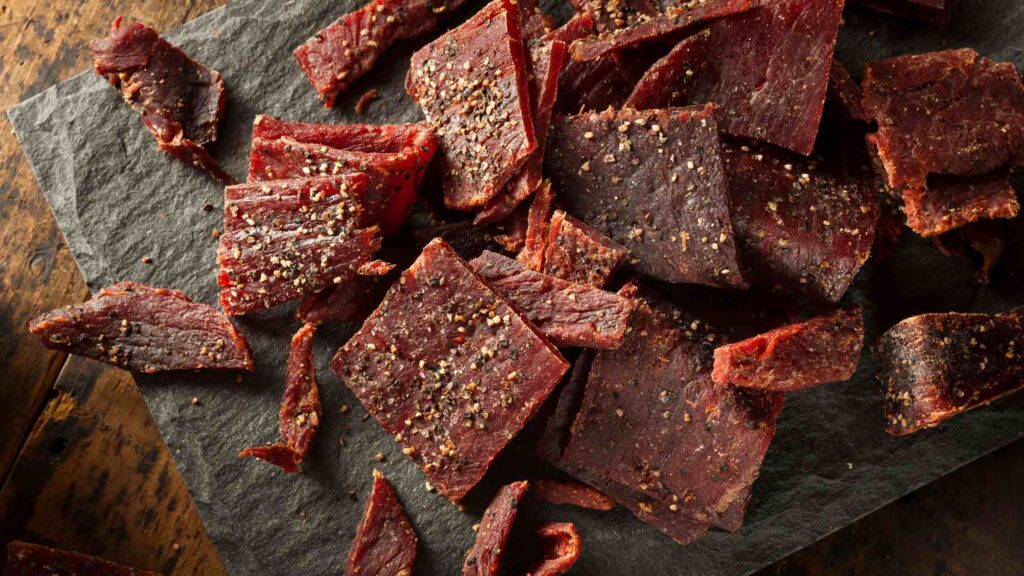When it comes to stockpiling your pantry for when disaster strikes, here are some necessary food items for keeping you and your family in optimal nutrition. In a perfect world, beef would be the most nutrient-dense food to keep for long-lasting nutritional benefits. Beef contains just about every nutrient and mineral one needs except magnesium (although bone broth contains a good amount) and vitamin D (which you can easily get from the sun hitting your eyes and stop wearing those sunglasses). But let’s think a little outside the box with this list so we can make sure we aren’t nutritionally depleted when surviving. Who says that survival foods shouldn’t come with variety and taste?
I know that grains, beans, and foods with long shelf lives are common on the list. But let’s consider things that offer a bit more sustenance, like protein and fat, and minerals and vitamins. This list will give you everything your body needs to thrive in a survival scenario.

- Bone Broth: Easy to make in large quantities to can and highly beneficial to your health and gut. Bone broth is a nutrient-rich liquid made by simmering animal bones and connective tissue in water over an extended period. This slow cooking process extracts valuable nutrients such as collagen, gelatin, amino acids, minerals, and vitamins from the bones and marrow. Collagen and gelatin provide support for joint health, skin elasticity, and gut function. Bone broth is also a rich source of essential amino acids, including glycine, proline, and glutamine, which support immune function, muscle repair, and overall well-being. Additionally, bone broth contains minerals such as calcium, magnesium, phosphorus, and potassium, which are essential for bone health, muscle function, and electrolyte balance. With its nourishing properties and versatility in cooking, bone broth serves as a flavorful and nutritious addition to a balanced diet.
- Freeze-dried Leftovers: One smart move for freeze-drying is to make a little extra of your meals every night and put the leftovers in the freeze-dryer. Over time, you will have a steady supply of delicious meals for when disaster strikes.
- Jerky: Whether you make your own (not sure why you wouldn’t because it’s way less expensive) or buy from the store, storing up jerky is one of the best foods to store for optimal nutrition. Jerky is a nutrient-dense snack made by drying and curing lean cuts of meat, typically beef, turkey, or pork. It is low in fat and carbohydrates but high in protein, making it an excellent source of sustained energy. A typical serving of jerky provides around 9-10 grams of protein, along with essential amino acids necessary for muscle repair and growth. Additionally, jerky contains essential vitamins and minerals such as iron, zinc, and B vitamins, which play crucial roles in energy metabolism, immune function, and overall well-being. While jerky can be high in sodium and preservatives, opting for homemade or minimally processed varieties can provide a flavorful and nutritious snack option for individuals seeking a protein-rich, on-the-go option.
- Animal Fats: Tallow, Lard, Duck Fat, Chicken fat- whatever fat you can save from every meal you make or animal you raise will sustain you more than any grain or veggie. These fats are primarily composed of saturated and monounsaturated fatty acids, which are crucial for various bodily functions. Saturated fats, found in foods like butter, lard, and tallow, serve as a stable source of energy and play a role in hormone production and cell membrane structure. Additionally, animal fats contain fat-soluble vitamins such as vitamin A, vitamin D, vitamin E, and vitamin K2, which are essential for vision, bone health, immune function, and blood clotting. Furthermore, animal fats are rich in cholesterol, a vital component of cell membranes and a precursor to important hormones like cortisol and testosterone.
- Freeze-dried animal organ meat: Even though it’s not the most tolerable in taste when you freeze-dry it and crumble it up in your meal, the mineral and nutritional benefits you gain are incredible. Organ meats are highly nutritious parts of animals that are often overlooked but are rich in essential vitamins, minerals, and nutrients. These nutrient-dense foods typically contain high amounts of protein, essential amino acids, and healthy fats. They are also abundant in vitamins such as vitamin A, vitamin B12, vitamin D, and vitamin K2, which are essential for vision, neurological function, bone health, and blood clotting. Additionally, organ meats are a significant source of minerals like iron, zinc, selenium, and phosphorus, important for immune function, energy metabolism, and tissue repair.
- Freeze-dried Eggs: – did you know you can free dry whole, cooked eggs or even scrambled eggs?! Eggs are a nutrient-dense food, packed with essential vitamins, minerals, and high-quality protein. A single large egg provides approximately 70 calories, 6 grams of protein, and 5 grams of healthy fats, including omega-3 fatty acids. Eggs are also rich in essential nutrients such as vitamin A, vitamin D, vitamin B12, riboflavin, and choline, which are vital for vision, bone health, neurological function, and cellular metabolism. Additionally, eggs contain significant amounts of minerals like iron, zinc, selenium, and phosphorus, necessary for energy production, immune function, and tissue repair. With their impressive nutritional profile and versatility in cooking, eggs are a nutritious and affordable dietary staple.
- Canned Meat: Chicken, fish, beef, sardines, the list goes on. You can do pretty much anything, so why not stock up on nutrient-dense options?
- Coconut Oil: One of my favorite of the oils, coconut oil is FULL of nutrients that you will need to keep you thriving. Coconut oil, derived from the flesh of mature coconuts, is prized for its rich nutrient profile and versatile culinary uses. It is predominantly composed of saturated fats, primarily medium-chain triglycerides (MCTs), which are easily metabolized by the body for quick energy. Coconut oil is unique in that it contains lauric acid, a medium-chain fatty acid with antimicrobial properties that may support immune function. Additionally, coconut oil contains small amounts of vitamins E and K, as well as trace amounts of iron. Its rich flavor and high smoke point make it ideal for cooking, baking, and frying, while its potential health benefits, including promoting heart health and supporting weight loss, have garnered considerable attention in recent years.
- Honey: With an incredibly long shelf life, honey is a go to for food storage that is full of nutrients. Primarily composed of carbohydrates, including glucose and fructose, honey also contains a significant amount of water, typically around 17-20% of its composition. Although it contains small amounts of various vitamins such as vitamin C and B vitamins, the levels are relatively low compared to other foods. Honey does, however, provide trace amounts of essential minerals like calcium, iron, and potassium, along with antioxidants such as flavonoids and phenolic compounds, which have been linked to various health benefits. Additionally, honey contains enzymes like invertase and glucose oxidase, aiding in its antimicrobial properties and digestion. It also offers prebiotics, such as oligosaccharides, which support a healthy balance of gut microbiota. With its diverse array of nutrients and bioactive compounds, honey serves not only as a natural sweetener but also as a valuable addition to a balanced diet, promoting overall health and well-being.
- Powdered Milk: Easy to make or cheap to buy, powdered milk has a sufficient amount of nutrients. Powdered milk is a convenient dairy product rich in essential nutrients. With approximately 496 calories per 100 grams, it offers a substantial source of protein, providing around 26 grams per serving, alongside 27 grams of fat and 39 grams of carbohydrates. This nutritional powerhouse also boasts vitamins A, D, and B12, vital for vision, bone health, and nerve function, respectively. Additionally, powdered milk contains an array of minerals like calcium, phosphorus, potassium, and magnesium, which are crucial for bone strength, energy metabolism, and muscle function. With its long shelf life and versatility, powdered milk serves as a convenient alternative to liquid milk.
- Medicinal Herbs: A diverse array of medicinal herbs exists, each offering unique therapeutic benefits for health. Here are a few to keep on hand. Echinacea is renowned for its immune-boosting properties, while ginseng serves as a potent adaptogen, aiding the body in coping with stress. Turmeric, with its active compound curcumin, exhibits powerful anti-inflammatory effects, while garlic supports cardiovascular health and possesses antimicrobial properties. Ginger aids digestion and alleviates nausea, while peppermint soothes digestive discomfort and has analgesic properties. Lavender and chamomile are prized for their calming effects on the nervous system, promoting relaxation and improving sleep quality. Holy basil, or Tulsi, acts as an adaptogen, supporting adrenal health and reducing stress levels. Rosemary enhances cognitive function and memory while offering antioxidant benefits. These medicinal herbs, steeped in tradition and backed by modern research, provide natural alternatives for promoting health and vitality.
If you have these 11 items in your pantry when SHTF, you will be set to thrive nutritionally for a long time. These foods last longer and will sustain you longer than any grain, fruit, or vegetable.


